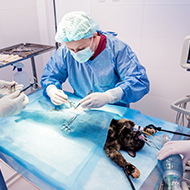Partnership to offer students neutering learning opportunities

The students will operate on animals that arrive into the clinic, enabling them to build on vital skills for a career in veterinary medicine.
Animal welfare charity Mayhew has teamed up with the University of Surrey to give students practical, hands-on experience in performing neutering procedures.
Mayhew is working with Surrey's School of Veterinary Medicine, giving fourth-year students the opportunity to learn about neutering at its Community Vet Clinic.
Located in Kensal Green, London, the charity will host students for two semesters a year - during which they will carry out neutering operations under the supervision of Surrey Vet's surgical and anaesthesia specialists.
The students will operate on animals that arrive into the clinic, enabling them to build on vital skills for a career in veterinary medicine.
Mayhew head veterinary surgeon, Justin Ainsworth, said: "Our partnership with the University of Surrey's School of Veterinary Medicine offers their fourth-year students the unique opportunity to get practicable knowledge of neutering as part of their degree course, as well as learning how to interact with pet owners, which is a very important part of a vet's role.
“This training, at this stage of their degree course, can only enhance their skills as vets and better prepare them for their future careers."
Surrey Vet School's teaching fellow in small animal surgery, Melanie Blevins, added: "The neutering clinic days hosted by Mayhew are an invaluable opportunity for our students to put all of their training into practice in a real-life environment with the full support and supervision of the University team.
“It not only allows them to utilise their practical skills in surgery and anaesthesia but to be involved in all the aspects of veterinary care that they have been training towards, patient care, communicating with owners and working as part of the veterinary team. It forms a vital part of their training and prepares them for their final year workplace-based rotations."



 The latest
The latest